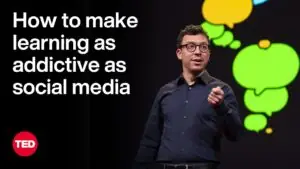In the age of globalization, many individuals relocate to countries different from where they were born, immersing themselves in entirely new cultures and languages. A recent post on Reddit highlighted a unique concern faced by many people: the fear of losing proficiency in their native language.

✅ AI Essay Writer ✅ AI Detector ✅ Plagchecker ✅ Paraphraser
✅ Summarizer ✅ Citation Generator
Key Takeaways:
- Language proficiency can diminish if not practiced regularly.
- The environment plays a crucial role in shaping our linguistic abilities.
- Regular practice and immersion in native media can help maintain and improve language skills.
- Online communities offer a platform to engage and practice one’s native language.
The Complexities of Language
Language is not only a means of communication. Few look at it this way, but it’s a complex mental process intricately linked to our nervous system. Our environment plays a pivotal role in shaping our linguistic abilities. When individuals relocate to a different country, they often face challenges related to language adaptation. While they strive to master the new language, their command over their native tongue might diminish if not practiced regularly. This phenomenon is not uncommon and is a testament to the brain’s adaptability, but also highlights the need for regular practice to maintain linguistic skills.
Language and its acquisition have been the subject of extensive scientific research, and some common facts and arguments can shed light on the complexities of language:
Critical Period Hypothesis. Proposed by linguist Eric Lenneberg, this hypothesis suggests that there’s an optimal period for language acquisition, typically before puberty. During this time, the brain is exceptionally receptive to linguistic input. After this period, while learning a new language is still possible, it might require more effort and may not lead to native-like fluency. This underscores the importance of early and consistent exposure to maintain proficiency in one’s native language.

Language and Identity: Psycholinguistic studies have shown that language is deeply intertwined with personal and cultural identity. When individuals move to a new linguistic environment, they often undergo a process of “code-switching,” where they alternate between languages based on the context. Over time, if one language dominates, the other might recede, leading to a potential identity shift.
L1 Attrition: This is a phenomenon where native speakers who move to a foreign linguistic environment experience a decline in their first language proficiency. Research in the field of neurolinguistics suggests that without regular use, neural connections associated with the native language might weaken, leading to decreased fluency. However, the foundational structures remain, allowing for potential relearning.
Cognitive Benefits of Bilingualism. Numerous studies have highlighted the cognitive advantages of being bilingual. Bilingual individuals often exhibit better multitasking skills, enhanced memory, and increased attentional control. However, maintaining proficiency in both languages is crucial to reap these benefits.
Sociolinguistic Factors. The environment plays a key role in shaping linguistic abilities. Sociolinguistic research indicates that when individuals are immersed in a dominant language environment, societal pressures might lead them to prioritize that language, inadvertently sidelining their native tongue.
A Personal Struggle
Maintaining the balance between native and adopted languages is not just a personal challenge but a reflection of deep-rooted neurological and sociolinguistic phenomena. It is now obvious what a Reddit user is going through. Their native language is a bridge to their past, culture, and cherished memories, as evidenced by their childhood journey of overcoming speech struggles through Turkish books. However, residing in the UK, surrounded predominantly by English, the user confronts an environment that inadvertently pushes their native tongue to the periphery, creating a linguistic vacuum.
“I’m Turkish, and grew up in Turkey. Obviously my english is not as fluent as it is in Turkish. But bcuz im consuming so much english content like on reddit or youtube and don’t really watch anything in Turkish, its gettin worse”
This internal struggle becomes real when friends comment on the deterioration of their Turkish proficiency, boosting feelings of linguistic alienation and highlighting the challenge of maintaining a connection to one’s roots.
“Some of my friends commented on that that my turkish is just worse now. Its very worrying.”
Desperate for help, the author asks for support and advice.
Reddit’s Take on Linguistic Challenges
A Reddit contributor’s post sparked a flurry of responses, not just echoing the poster’s thoughts but also offering insights, advice, and experiences.
Shared Experiences. The universality of the user’s struggle was evident in the myriad of personal stories shared. From individuals who still reside in their homeland to those who’ve ventured abroad, the linguistic challenges seemed to be a common thread. One user mentioned, “I still live in my native country and thus speak Spanish every day, but sometimes mess my words up and forget other words.” This comment stresses that even within one’s native environment, linguistic slips can occur, highlighting the fragile nature of language proficiency.
Practical Solutions. The community was about sharing woes and offering tangible, actionable solutions. A user suggested,
“Watch content both in Turkish and English. Go on YouTube and find some Turkish YouTubers.”
This advice underlines the importance of active engagement with one’s native language through modern platforms, ensuring it remains a living, breathing part of daily life.
Understanding L1 Attrition. The abovementioned “L1 attrition” was also introduced by a respondent, providing a scientific lens to the user’s concerns. The comment offers reassurance that the foundational structures of the native language remain intact, even if accessing them becomes slower over time.
“It’s called L1 attrition. Luckily it’s all still there in your memory, but accessing it is slower due to lack of use.”
Success Stories. Amidst the shared challenges, there were flashes of hope in the form of success stories, when determination and consistent effort helped reconnect people with their linguistic roots. One user recalls whose native language is Finish, recalls,
“A turning point for me was when I had a kid. My husband is not Finnish and we’re living in Canada but I knew that I wanted my kids to speak Finnish. I set myself a goal of doing something in Finnish every day, whether it was reading an article in the Finnish news, watching a movie or series, writing on some Finnish subreddit etc. It’s important to choose something you like to do, and just make sure it’s in your language. In the end I reached my goal and ever since my daughter was born I only speak to her in Finnish. She is 5 now and Finnish is her strongest language although she is growing up in Canada and because of our setup she also speaks Portuguese, French and English. You can do this!“
The Emotional Aspect. Beyond the practical, language’s emotional and identity-related facets were a recurring theme. A user’s comment, “I have the same problem… My brain treats it like a foreign language that i know quite well but still… i literally need some time to decide which grammar structure to use,” touches upon the deeper emotional turmoil that can arise from feeling disconnected from one’s native tongue.
Expert Advice and Best Practices
While the Reddit community offers a wealth of personal experiences and insights, it’s also beneficial to turn to the experts in the field of linguistics and language education. Experts in linguistics and language education have conducted extensive research on the challenges individuals face, like our Reddit user, who have proposed several strategies to maintain and enhance linguistic proficiency.
| Regular Exposure | Just as muscles require regular exercise to stay fit, our linguistic abilities need consistent engagement. Set aside dedicated time each day to engage with content in your native language, be it reading a book, watching a show, or even listening to a podcast. |
| Active Practice | Passive consumption is beneficial, but active practice can significantly boost linguistic skills. Engaging in conversations, writing daily journals, or even participating in online forums in one’s native language can help reinforce language structures and vocabulary. |
| Language Partners | Finding a language partner or joining a language exchange program can be invaluable. These platforms allow individuals to converse in their native tongue, providing a real-world context and helping maintain fluency. |
| Reconnect with Culture | Language is deeply intertwined with culture. By reconnecting with one’s native culture, be it through festivals, traditions, or even cuisine, individuals can reignite their emotional connection to the language. |
| Educational Resources | Numerous online platforms, apps, and courses are dedicated to language learning and maintenance. Platforms like Duolingo and even specialized YouTube channels can offer structured lessons and exercises to practice and improve linguistic skills. |
| Stay Updated | Languages evolve over time. Staying updated with the latest slang, idioms, or even grammatical structures can help individuals feel more connected and updated with their native language. |

With a mix of memories, feelings, and identity, language is a lot more than just words. Many of us juggle with keeping our native tongue sharp, especially when surrounded by a new one. But nature is wise and takes care of us, allowing our brains to adjust and be flexible to various conditions. So, even if we feel a bit rusty in our first language, we can get back in the groove with some effort and determination. After all, language is a lot like dancing; sometimes, we miss a step, but with some practice, we’re back on track. So, whether you’re a native speaker or juggling two languages, remember it’s all part of the journey. Keep chatting, keep learning, and most importantly, keep dancing to your own linguistic rhythm!
Follow us on Reddit for more insights and updates.





Comments (0)
Welcome to A*Help comments!
We’re all about debate and discussion at A*Help.
We value the diverse opinions of users, so you may find points of view that you don’t agree with. And that’s cool. However, there are certain things we’re not OK with: attempts to manipulate our data in any way, for example, or the posting of discriminative, offensive, hateful, or disparaging material.